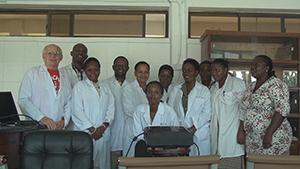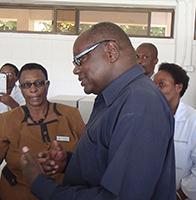By: Anne Zaczek, U.S. Grains Council Manager of Global Development Programs
The U.S. Grains Council’s (USGC’s) staff and consultants in collaboration with the Tanzanian Central Veterinary Laboratory’s (CVL’s) staff have reached a milestone in the Tanzania Food for Progress program with the introduction of new testing equipment in the lab.
In late 2015, the Council shipped a urease testing system and Near-Infrared Spectroscopy (NIR) testing equipment to the lab. These systems were ordered, set-up and calibrated by Tokkie Groenewald, who consults for the Council, to help the lab’s technicians evaluate the quality of the grains that Tanzanian buyers and end-users are utilizing in their feed rations.
In order for the testing equipment to be fully utilized, Groenewald traveled to Dar es Salaam in February to finish setting it up and to provide training for the lab’s staff on how to properly use it.
The goal of installing the new equipment and providing such training is to increase the quality and quantity of information available from the lab, which should, in turn, help end-users make more informed buying decisions and promote the usage of high-quality grains in their livestock feed.
“The approach of this training is to concentrate on developing skills,� Groenewald said. “This is quite challenging, as a lot of time is spent with the staff repeating the exercises and testing their understanding of the underlying principles to ensure everyone who could manage these tricky procedures in the future has the required skills to obtain reliable results.�
Tanzania Veterinary Laboratory Agency (TVLA) Chief Executive Dr. Furaha Mramba visited the lab during one of Groenewald’s training sessions and received a demonstration from the lab’s staff of their capabilities and understanding of the systems.
Dr. Mramba was incredibly impressed and had Aaron Luziga, assistant director for livestock and marketing information at the Ministry of Livestock Development and Fisheries in Tanzania, visit the lab as well. Following that visit, the Ministry agreed to move forward with a marketing campaign for the lab as soon as the staff is comfortable and confident with the testing process and procedures.
“We plan to encourage the manufacturers and farmers to bring their grain samples to see the exact operation so they will see that their results are the best possible,� Luziga said. “We hope that through changes like this, we will continue to improve our industry.�
This new equipment is a building block towards one major objective of the Food for Progress program in Tanzania, which is to create a fully-renovated and operational lab to test the quality of feed ingredients.
The program’s goals also include developing self-sufficient industry associations for poultry producers and feed manufacturers and improving broiler and layer production through training seminars.
Collectively, these activities will help local feed producers and farmers provide a higher-quality product to consumers and, over the long term, build demand for coarse grains used as feed.
Click here to read past Global Update articles about Tanzania.



